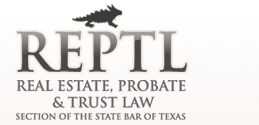Glenn Karisch’s Texas Probate Resources
Welcome to the Texas Probate Resources website, your source for information on estate planning, probate, and trust law in Texas. This site is owned and maintained by Glenn Karisch of Karisch Jonas Law, PLLC, in Austin, Texas. For information dating from before February 1, 2011, visit the legacy site at texasprobate.net.
Texas Probate
REPTL decedents' estates bill is worth a closer look
HB 2046 would make key changes affecting every estate planning and probate lawyer in Texas.
Rep. Will Hartnett (R-Dallas) filed HB 2046 Wednesday. This bill makes numerous changes to the Texas Probate Code that are supported by the Real Estate, Probate and Trust Law Section of the State Bar of Texas.
Signing wills just once
Among the highlights of HB 2046 is a new way to handle will executions in Texas. Current law requires the testator and two witnesses to sign the will and then, if the will is self-proved, to separately sign the self-proving affidavit. HB 2046 amends Section 59 to provide the option of having the testator and witnesses sign a combined will and self-proving affidavit so that each only has to sign once. This is a holdover change from 2009. The 2009 bill failed to pass because of a legislative logjam at the end of the session.
This change, along with others made in 2009 regarding the execution of declarations of guardian, medical powers of attorney and directives to physicians, should speed up document signings. Old foagies who like the current two-signature method may continue to use it.
Independent administration changes
Another holdover from 2009 are changes to independent administration. REPTL proposed these changes to clarify Texas's independent administration statutes in anticipation of their inclusion in the new Estates Code which takes effect January 1, 2014. If HB 2046 passes, these changes would take effect September 1, 2011, and be carried forward into the Estates Code.
The proposed independent administration changes will be covered in a separate post.
No need to file an inventory
Living trust proponents frequently tout the increased privacy of those plans over will-based plans since in a will-based plan an inventory must be filed with the court. HB 2046 would change this for independent administrations in cases where there are no unpaid debts, except for secured debts, taxes and administration expenses. In that case, the independent executor could file an affidavit in lieu of an inventory. The affidavit must state that the independent executor has provided each beneficiary with a "verified, full, and detailed inventory."
The changes to Section 250 would not do away with the requirement of preparing an inventory; it would do away with the filing of the inventory in some cases. Interestingly, under current law the personal representative is not required to provide a beneficiary with a copy of the inventory, although doing so is good practice. The new law would require delivery of a copy in order to avoid the filing requirement.
As filed, it appears that dependent administrators also could file an affidavit in lieu of filing an inventory. A change is in the works to limit this procedure to independent administrations, for obvious reasons.
Overruling Holmes v. Beatty
Holmes v. Beatty, 290 S.W.3d 852 (Tex. 2009), caused shockwaves in the probate and estate planning community for two reasons:
Will Hartnett, Author of HB 2046
First, and most importantly, the Supreme Court relaxed the standards for creating rights of survivorship with respect to community property, holding that a " joint tenancy" or " JT TEN" designation on an account is sufficient to create rights of survivorship in community property under Section 452 of the Texas Probate Code.
Second, the Supreme Court held that stock certificates issued from a community property with right of survivorship brokerage account continue to be survivorship property even though the the certificates themselves do not meet the requirements for survivorship agreements.
Will Hartnett, Author of HB 2046HB 2046 overturns Holmes on the first of these points. It would add this sentence to Section 452: "A survivorship agreement will not be inferred from the mere fact that the account is a joint account or that the account is designated JT TEN, Joint Tenancy, joint, or other similar abbreviation." Parallel language is added to Section 439, which governs non-community property multi-party accounts. HB 2046 specifically states that the bill is intended to overturn the ruling of the Texas Supreme Court in Holmes v. Beatty.
The bill is silent on the other significant holding in Holmes, so stock certificates issued out of community property with right of survivorship accounts may continue to be survivorship property, at least to the extent described in Holmes.
Reasonable compensation for executors
Jose Rodriguez, Author of SB 1198
Jose Rodriguez, Author of SB 1198The bill also would change the default basis for compensation of personal representatives of decedents' estates. Currently compensation is based on 5% of all sums received in cash plus 5% of all sums paid out in cash, subject to the limitations stated in Section 241. HB 2046 would replace this with a "reasonable compensation" standard. HB 1837 makes a similar change for guardianships.
Update: On March 4, 2011, Sen. Jose Rodriquez (D-El Paso), filed SB 1198 as REPTL's decedent's estates bill in the Senate.
x-Did Not Pass: HB 2046 -- REPTL decedents' estates bill

Caption: Relating to decedents' estates.
Author: Hartnett
Relevance: This omnibus bill is supported by the Real Estate, Probate and Trust Law Section of the State Bar of Texas. It makes multiple changes to the Texas Probate Code affecting the estates of decedents. It also makes parallel changes to the new Estates Code. Changes include:
An option requiring only one signature of the testator and the witnesses on the will and self-proving affidavit (the old two-signature method still would be permitted). (Section 59)
Changes to the independent administration provisions of the Probate Code in anticipation of enactment of the new Estates Code, including addressing technical issues like the power of sale and creditor claims. (Sections 145 -- 151)
In independent administrations where there are no unpaid creditors, permitting the independent executor to deliver the inventory to the beneficiaries while filing an affidavit, not the inventory, with the court. (Section 250)
Changing the 5% of amounts collected/5% of certain payments method of determining the compensation of personal representatives to a "reasonable compensation" standard. (Section 241)
Confirming that a right of survivorship will not be presumed from joint ownership or joint tenancy of multi-party accounts and community property, legislatively overruling part of Holmes v. Beatty, saying "a survivorship agreement will not be inferred from the mere fact that the account is a joint account or that the account is designated JT TEN, Joint Tenancy, joint or other similar abbreviation." (Sections 439 and 452)
See "REPTL decedents' estates bill is worth a closer look" on texasprobate.com.
See "REPTL bill tweaks independent administration" on texasprobate.com.
x-Did Not Pass: HB 2095 -- Genetic testing in heirships
Caption: Relating to genetic testing in certain proceedings to declare heirship.
Author: Thompson
Bill History
Bill Text
Relevance: This bill would amend Section 53C of the Probate Code to provide that the presumption under Section 160.505 of the Family Code would apply in determining heirship if genetic testing is ordered, and that presumption can be rebutted in the same manner as provided by Section 160.505.
x-Did Not Pass: SB 1027 -- Attorney/guardians can't provide legal services
Caption: Relating to the provision of legal services by a guardian in connection with a guardianship.
Author: Harris
Bill History
Bill Text
Relevance: This bill would add Section 773A to the Probate Code, reading: "An attorney who services as guardian may not provide legal services in connection with the guardianship." It would repeal Section 665D, which was added in 2009 and which provides that an attorney serving as guardian who also provides legal services (1) must file detailed billing with the court and (2) "is not entitled to payment of attorney's fees for guardianship services that are not legal services."
x-Did Not Pass: HB 1934 -- Attorneys' fees of beneficiary in will contest
Caption: Relating to an allowance from a decedent's estate for devisees in and beneficiaries of a will who defend and prosecute certain proceedings relating to the will.
Author: Woolley
Bill History
Bill Text
Relevance: If HB 1934 passes, a beneficiary in a will contest must be successful in that litigation in order to be eligible to have his or her attorneys' fees paid from the decedent's estate. Currently, Texas Probate Code Section 243 permits the court to award attorneys' fees to an beneficiary who acts in good faith and with just cause whether successful or not.
Ad litem fees and attorneys' fees in guardianships: who pays?
Who should pay attorney ad litem fees, guardian ad litem fees, the applicant's attorneys' fees and other costs when someone applies for the creation of a guardianship? Three bills now pending in the Texas Legislature take different approaches.
Jane Nelson, Author of SB 220
Under Section 665A of the Texas Probate Code, the proposed ward's estate is charged with attorney ad litem fees, guardian ad litem fees and other costs -- whether or not the application for appointment of a guardian is successful -- unless his or her estate is insufficient to pay those fees and costs, in which case the county bears the expense.
Under Section 665B, if a guardianship or management trust is created, the court may order that any applicant's attorneys' fees be paid from the ward's estate, or from the county treasury, if the court finds that the applicant acting in good faith and for just cause.
Is it fair that the ward's or the proposed ward's estate is required to pay the costs of the attorney ad litem or guardian ad litem? Are there times when another party should have to bear those expenses? Should the county treasury be stuck with ad litem fees and costs and the applicant's attorneys' fees if the proposed ward's estate is insufficient to pay them?
Chris Harris, Author of SB 286
SB 286 would add this sentence to Section 665A: "The court may allocate attorney's fees taxed as costs under this section among the parties as the court finds is fair and just." This bill, authored by Sen. Chris Harris (R-Arlington), would allow the judge to make another party pay the costs of attorneys ad litem, guardians ad litem, interpreters, etc., if it is "fair and just" to do so. Section 665B is amended to permit the applicant's attorneys' fees to be allocated among the parties to the guardianship proceeding "as the court finds is fair and just," so long as a guardianship or management trust is created. SB 286 also requires ad litem fees under Section 665A and the applicant's attorneys' fees under Section 665B to be set in an amount which is "fair and just."
SB 220 takes a similar approach. This bill, authored by Sen. Jane Nelson (R-Flower Mound), amends Section 665A to permit the court to "allocate amounts taxed as costs under this section among the parties as the court finds is just and equitable." It provides that, if the proposed ward's estate is unable to pay "the costs allocated to the proposed ward," the county is responsible for those costs. SB 220 also amends Section 665B to permit the applicant's attorneys' fees to be "allocated as the court finds is just and equitable," so long as the court creates a guardianship or management trust.
Surely if it is "fair and just" to allocate costs and fees to a party under SB 286, it also will be "just and equitable" to do so under SB 220. Perhaps the bills could be reconciled so that costs and fees are allocated if it is "fair, just and equitable" to do so.
Will Hartnett, Author of HB 1325
HB 1325 gives the court less authority to charge others with ad litem fees. This bill, authored by Rep. Will Hartnett (R-Dallas), would add subsection (b) to Section 665A: "If the proposed ward's assets are insufficient to pay for the cost of an attorney ad litem appointed under this chapter, the court may order the applicant in the guardianship proceeding to pay that cost." A similar change to Section 669 would provide the same treatment for guardian ad litem fees.
HB 1325 would allow the court to relieve the county treasury of the obligation to pay an attorney ad litem or guardian ad litem if the proposed ward's estate was unable to bear that cost. It would not permit assessing these costs against the applicant or other parties if the proposed ward's estate is able to bear them. The authority of the court to assess costs and the applicant's attorney's fees in SB 220 and SB 286 does not depend on whether or not the proposed ward is unable to pay those costs and fees.
Some judges have wanted the power to assess costs and fees in guardianships against litigants whose conduct demonstrates that they should bear them. SB 220 and SB 286 give them that authority. HB 1325 does not.
Case Update -- Jarvis v. Feild
Jarvis v. Feild, 327 S.W.3d 918 (Tex. App.—Corpus Christi-Edinburg 2010, no pet. h.).
ESTATE ADMINISTRATION -- Venue
Litigant objected to the court’s venue to probate a will. Because Litigant did not object until Litigant appealed the admission of the will to probate, the court held that she waived her venue argument.
Moral: Objections to venue should be timely filed or else they will be deemed waived.
ESTATE ADMINISTRATION -- Inventory
Litigant appealed asserting that an approved inventory was incomplete and misstated the value of the listed property. However, her appeal did not specifically indicate she was appealing the inventory order but rather objected to the approval of the account for final settlement which the court issued many months later. Litigant argued that the two orders were linked so the appeal of the account for final settlement automatically appealed the approval of the inventory. Although there was no support for Litigant’s argument, the court decided to review the inventory approval because appellate issues should be liberally construed so the right to appeal is not lost. After examining the evidence, the court determined that the trial court did not err in approving the inventory.
Moral: A person dissatisfied with the court’s approval of an inventory should take action in a timely manner and clearly indicate the court order to which the person is objecting.
For summaries of other recent Texas cases, please follow this link: http://www.professorbeyer.com/Case_Summaries/Texas_Case_Summaries.htm.
Gerry W. Beyer
Governor Preston E. Smith Regents Professor of Law
Texas Tech University School of Law
1802 Hartford St.
Lubbock, TX 79409-0004
voice (806) 742-3990, ext. 302
fax (978) 285-7941
e-mail gwb@professorbeyer.com
web http://www.ProfessorBeyer.com
blog http://lawprofessors.typepad.com/trusts_estates_prof/
SSRN (articles) http://ssrn.com/author=461383
Twitter Gerry_Beyer
Case Update -- In re Guetersloh
In re Guetersloh, 326 S.W.3d 737 (Tex. App.—Amarillo 2010, no pet. h.).
TRUSTS -- Pro Se
Trustee attempted to represent himself pro se, that is, without an attorney, in both his capacity as a trustee and in his individual capacity. The appellate court held that Trustee had no right to proceed pro se in his representative (trustee) capacity but could proceed without an attorney with regard to claims in his individual capacity.
The court explained that allowing Trustee to proceed pro se in his representative capacity would be the unauthorized practice of law. The court stated that “if a non-attorney trustee appears in court on behalf of the trust, he or she necessarily represents the interests of others, which amounts to the unauthorized practice of law.” The court relied on Steele v. McDonald, 202 S.W.3d 926 (Tex. App.—Waco 2006, no pet.) in which the court held that a non-lawyer may not appear pro se in the capacity as an estate’s independent executor.
Moral: A trustee who is not an attorney may not appear in court pro se in the trustee’s representative capacity.
For summaries of other recent Texas cases, please follow this link:http://www.professorbeyer.com/Case_Summaries/Texas_Case_Summaries.htm.
Gerry W. Beyer
Governor Preston E. Smith Regents Professor of Law
Texas Tech University School of Law
1802 Hartford St.
Lubbock, TX 79409-0004
voice (806) 742-3990, ext. 302
fax (978) 285-7941
e-mail gwb@professorbeyer.com
web http://www.ProfessorBeyer.com
blog http://lawprofessors.typepad.com/trusts_estates_prof/
SSRN (articles) http://ssrn.com/author=461383
Twitter Gerry_Beyer
Case Update -- In re Hudson
In re Hudson, 325 S.W.3d 811 (Tex. App.—Dallas 2010, no pet. h.).
ESTATE ADMINISTRATION -- Appeal -- Admitting Will to Probate and Granting Independent Administration
Will Contestant requested a jury trial. However, the trial court heard the application without a jury and over Contestant’s objection. The court then admitted the testator’s will to probate and issued an order granting independent administration. Contestant then filed a petition for a writ of mandamus.
The appellate court denied the petition because Contestant has an adequate remedy on appeal. The court held that an order admitting a will to probate and granting an independent administration was a final order and thus appealable.
Moral: An order admitting a will to probate and granting independent administration is a final order which a dissatisfied person may appeal.
For summaries of other recent Texas cases, please follow this link: http://www.professorbeyer.com/Case_Summaries/Texas_Case_Summaries.htm.
Gerry W. Beyer
Governor Preston E. Smith Regents Professor of Law
Texas Tech University School of Law
1802 Hartford St.
Lubbock, TX 79409-0004
voice (806) 742-3990, ext. 302
fax (978) 285-7941
e-mail gwb@professorbeyer.com
web http://www.ProfessorBeyer.com
blog http://lawprofessors.typepad.com/trusts_estates_prof/
SSRN (articles) http://ssrn.com/author=461383
Twitter Gerry_Beyer
REPTL bills would make changes to trusts, guardianships and powers of attorney
Rep. Will Hartnett (R-Dallas) filed three bills supported by the Real Estate, Probate and Trust Law Section of the State Bar of Texas Friday.
The most significant is HB 1858, which is a new Durable Power of Attorney Act for Texas. It would replace the current statutory durable power of attorney form for a new form with a disclosure statement and places for the principal to specify if he wants the agent to be able to create, revoke amend trusts; make gifts; create or change rights of survivorship; create or change beneficiary designations; and waive the principal's right to be a beneficiary of a joint and survivor annuity. Most of the changes are based on the new Uniform Power of Attorney Act adopted by the National Conference of Commissioners on Uniform State Laws in 2006. It replaced the old Uniform Durable Power of Attorney Act upon which Texas's current power of attorney statutes are based. The new act is more specific about the agent's duties and responsibilities.
Will Hartnett, Author of HB 1835, HB 1837 and HB 1858
Will Hartnett, Author of HB 1835, HB 1837 and HB 1858HB 1837 would make numerous changes to Texas's guardianship statutes, including replacing the current 5% of income, 5% of disbursements method of determining guardianship compensation with a "reasonable compensation" standard. It also would permit a person with a physical disability only eligible to apply for the creation of a guardianship management trust (867 Trust).
HB 1835 makes mostly minor and technical changes to the Texas Trust Code. One change of significance to persons handling estates of 2010 decedents is an extension of the 9-month deadline for disclaimers to match the one in the 2010 tax act.
Jose Rodriguez, Author of SB 1192, SB 1196, SB 1197 and SB 1198
Jose Rodriguez, Author of SB 1192, SB 1196, SB 1197 and SB 1198Another REPTL bill -- making changes affecting decedents' estates -- is expected but has not yet been filed.
Update: On March 2, 2011, Rep. Hartnett filed HB 2046, which is REPTL's decedent's estates bill. Sen. Jose Rodriquez (D-El Paso), filed identical REPTL bills in the Senate on March 4, 2011:
x-Did Not Pass: HB 1835 -- REPTL trust bill
 Caption: Relating to trusts.
Caption: Relating to trusts.
Author: Hartnett
Bill History
Bill Text
Note: While HB 1835, its companion, SB 1197, passed both houses and, as of May 19, 2011, is awaiting Governor Perry's signature.
Relevance: This bill is supported by the Real Estate, Probate and Trust Law Section of the State Bar of Texas and makes several minor or technical changes to the Texas Trust Code. It:
- Contains a special extension of the disclaimer deadline to match the extension in the 2010 tax law. (Section 112.010)
- Makes a slight change in the forfeiture (in terrorem) statute -- "just cause" must have existed for bringing the action, not "probable cause." (Section 112.038)
- Allows waiver of notice of nonjudicial divisions and combinations of trusts. (Section 112.057)
- Makes clear that a county court at law exercising the jurisdiction over a trust given it by Section 4B of the Probate Code has trust jurisdiction. (Section 115.001)
- Makes venue in a trust case proper in a court in which an estate is pending. (Section 115.002)
- Removes a beneficiary whose interest has been distributed, extinguished, terminated or paid from the list of necessary parties to trust litigation. (Section 115.011)
- Makes a couple of technical changes to the Texas Uniform Principal and Income Act (Sections 116.005 and 116.205)
See "REPTL bills would make changes to trusts, guardianships and powers of attorney" on texasprobate.com.
x-Did Not Pass: SB 960 -- Convicted felon as independent executor
Caption: Relating to the waiver of the disqualification of a convicted felon from serving as independent executor of a decedent's estate.
Author: Wentworth
Bill History
Bill Text
Relevance: This bill would permit a convicted felon to serve as independent executor if the decedent appointed the felon and waived the disqualification of felons from service, so long as the felon otherwise qualifies as personal representative.
x-Did Not Pass: HB 1858 -- REPTL power of attorney bill

Caption: Relating to the creation, administration, and interpretation of powers of attorney, including statutory powers of attorney.
Author: Hartnett
Relevance: This bill is supported by the Real Estate, Probate and Trust Law Section of the State Bar of Texas. It is the "Durable Power of Attorney Act," which rewrites Texas law regarding durable powers of attorney. Most of these changes are based on the new Uniform Power of Attorney Act, which was adopted by the National Conference of Commissioners on Uniform State Laws in 2006. It changes the statutory durable power of attorney form significantly. The changes are too numerous to mention here, but here are a few highlights:
Powers of attorney are presumed to be durable unless they expressly terminate on disability.
The act lists the persons who have standing to bring an action to construe a power of attorney, review an agent's conduct or grant appropriate relief.
The point at which an agent accepts appointment is defined.
The act provides protections for persons accepting powers of attorney and consequences for persons who don't accept a power of attorney.
Agents are permitted to do the following only if the principal specifically authorizes these actions:
Create, amend, revoke, or terminate an inter vivos trust.
Make a gift.
Create or change rights of survivorship.
Create or change a beneficiary designation.
Waive the principal's right to be a beneficiary of a joint and survivor annuity.
There's a totally new statutory durable power of attorney form, which includes a disclosure statement and a statement of the agent's duties.
There's a new form for an agent's certification as to the validity of a power of attorney and the agent's authority.
This is a significant piece of legislation that will change power of attorney practice if it is enacted.
See "REPTL bills would make changes to trusts, guardianships and powers of attorney" on texasprobate.com.









